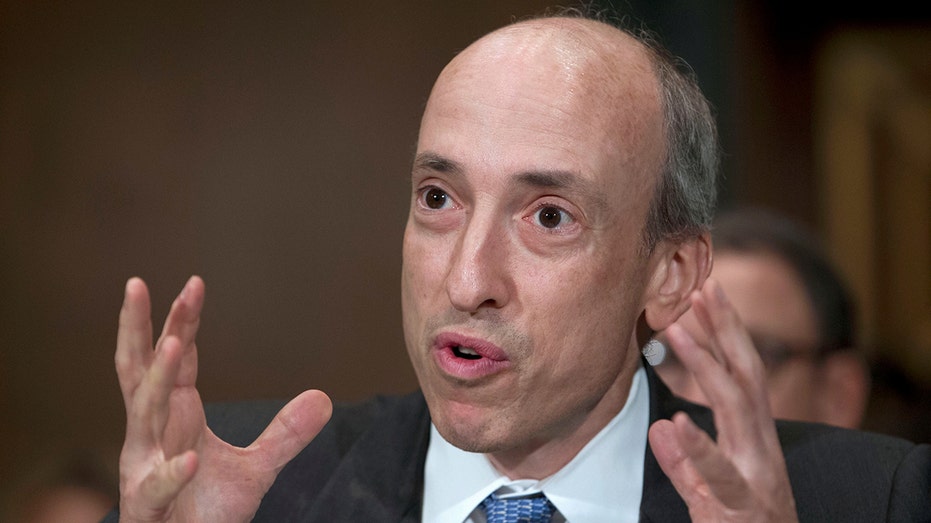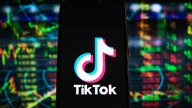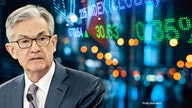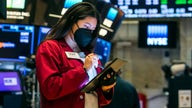The Securities and Exchange Commission is weighing a significant crackdown on so-called meme stock investing that could impose additional regulatory burdens on low-and-no fee brokerages that have been at the center of processing trades of AMC Entertainment, GameStop, and other risky stocks FOX Business has learned.
SEC officials have discussed whether they could impose upon brokerages, such as Robinhood, a regulation that could force the firms to warn investors about the pitfalls of buying these risky stocks before a trade is completed, according to people with direct knowledge of the matter.
| Ticker | Security | Last | Change | Change % |
|---|---|---|---|---|
| AMC | AMC ENTERTAINMENT HOLDINGS INC | 55.00 | +7.09 | +14.80% |
| GME | GAMESTOP | 280.01 | +31.65 | +12.74% |
Shares of these companies have exploded in recent days, buoyed by strong buying from retail day traders that trade stocks based on tips from message boards, such as Reddit's "WallStreetBets" and through easy-to-use trading apps such as the one offered by Robinhood. They're also heavily shorted by hedge funds that believe shares are far over-valued given their business outlooks.
AMC CEO TAKES TO TWITTER TO UNDERSTAND HIS RETAIL INVESTORS
But SEC Chair Gary Gensler is worried these stocks are too easy to trade on Robinhood and elsewhere — and that investors could be setting themselves up for massive losses.
ROBINHOOD FATTENS UP BOARD AHEAD OF IPO
He has suggested that one way to deal with the "gamification" of trading epitomized in the wild run-ups in shares like AMC and GameStop is to force these brokers to act more like fiduciaries as opposed to passive trading platforms that merely process trades, these people say.
AS NYSE HALTS AMC, ROBINHOOD TAKES THE HEAT

(REUTERS/Jose Luis Magana)
By imposing the regulation, known as "Regulation Best Interest" (Reg BI), Robinhood would have to "step in" and warn investors about the risk of trading some of these stocks, said one person with knowledge of Gensler’s thinking. The SEC has begun to scrutinize the wild trading in shares of the meme names which only last year were trading as penny stocks.
CLICK HERE TO READ MORE ON FOX BUSINESS
An SEC spokesman didn’t respond to multiple requests for comment.
Enforcing the rule would provide yet another regulatory burden of investing apps like Robinhood and its business model which is aimed at making investing fun and almost seamless to novices. As reported, Robinhood is eying an IPO in the coming weeks and its user growth has exploded over the past year, all of which was aided by the buying of the meme stocks on its platform.
AMC STOCK BANNER FLIES HIGH OVER FLORIDA BEACHES
But Gensler is telling people that the ease of Robinhood and the gamification aspects of its business model (the company has since ended showering user apps with digital confetti after a trade) could be interpreted by securities regulators as the company giving "advice" since such features could encourage investors to buy risky stocks.
As a result, Robinhood could be viewed as a fiduciary, which would allow regulators to impose additional regulatory burdens on it and other discount brokers like E-Trade, Ameritrade and Charles Schwab, these people add.
Robinhood did not respond to a request for comment.
Regulation BI was established by the SEC in 2019; it’s basically a "know-your-customer" regulation forcing brokers to only recommend financial products to clients that are in their best interests. Low-fee and no-fee brokers like E-Trade, Ameritrade, and Robinhood have been exempt from such rules because they involve self-directed trading as opposed to trades based on the recommendation of a financial adviser.
While legal experts say regulators could expand the definition of what constitutes advice, the move could face serious legal challenges. The SEC could direct the Financial Industry Regulatory Authority (FINRA), a regulator that provides front-line regulations of brokers, to enforce the wider interpretation of Reg BI.
"If this were to happen, it is most likely that it would be done by a FINRA rule, rather than an SEC one. FINRA can regulate best practices for a broker," said John Coffee, professor of securities law for Columbia University. "It could be in part justified by Regulation Best Interest, but that rule only applies if a recommendation is made. In many cases, that is debatable."
It’s unclear how serious Gensler is in expanding the scope of Regulation BI, but people with knowledge of his thinking say he believes the gamification of trading is the root cause of the wild run-up in shares of the meme stocks beyond rational financial justification. He worries that the stocks will eventually crash causing massive harm to small investors.
The finances of companies like AMC and GME remain suspect even as their stocks have found new life among many first-time retail traders. These novice investors flocked to trading during the pandemic lockdowns as a hobby using Robinhood’s no-fee app and other low-cost trading platforms.
The meme stocks have been gyrating wildly from highs earlier in the year and have seen a resurgence in recent weeks. AMC and GameStop are up nearly 2000% and 1500% respectively since the beginning of the year.
In less than a month, shares of AMC have spiked 450%, bringing the money-losing theater chain’s market values to nearly $30 billion before Monday’s close. The stock action forced the company recently to put out an unusual warning to investors that its shares may be overvalued and could be crushed soon.
The SEC said in a statement on Monday that it "continues to monitor the meme stock frenzy "in light of the ongoing volatility in certain stocks to determine if there have been any disruptions of the market, manipulative trading, or other misconduct."




















